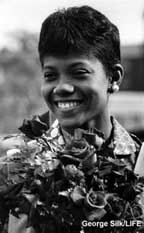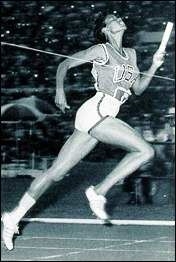 |
The word hero is hard to define. To me, a hero is not just someone who rescued a child from a burning house, or someone who saved a drowning person. A hero displays fortitude, applies themselves and works hard for their goal, and remains open-minded and humble. A hero overcomes obstacles, and makes an impact, no matter how small. Wilma Rudolph showed all of these traits throughout her lifetime, and that qualifies her as a hero.
Wilma Rudolph was born on June 23, 1940, weighing only four and a half pounds. From the beginning, she was faced with challenges. The hospital was segregated, so the premature baby had to be cared for at home by her mother. Wilma's family was rather poor and very large; she was the 20th out of 21 children. By the time she was four years old, she contracted polio and scarlet fever, and lost most of the mobility in one of her legs. But, through the persistence of her mother and black doctors Wilma was finally able to walk with the help of a metal leg brace. Afterwards, Wilma continued to fight for use in her legs, practicing walking around her house. Then, at age twelve, after years of therapy, she was able to walk without the use of her leg brace.
At the end of her eight grade year, Wilma was determined to be a basketball player. For her freshman year she tried out, and by her sophomore year made the team. She was an excellent player, and in her sophomore year scored 803 points in 25 games. It was during this time that Wilma began to run track. She soon found that this was her greater strength, and Tennessee State women's track coach Ed Temple told her of her great potential. He asked her to train with the team during the summer. In four seasons of high school track Wilma never lost a race. When she was only 16 years old, she qualified for the Summer Olympic games in Melbourne, Australia. Although she lost, her relay race came home with the bronze. Wilma was understandably happy, but this young woman was ready for greater things: "I remember going back to my high school this particular day with the bronze medal and all the kids that I disliked so much or I thought I disliked ... put up this big huge banner: `Welcome Home Wilma.' And I forgave them right then and there.... They passed my bronze medal around so that everybody could touch, feel and see what an Olympic medal is like. When I got it back, there were handprints all over it. I took it and I started shining it up. I discovered that bronze doesn't shine. So, I decided I'm going to try this one more time. I'm going to go for the gold." Which is exactly what she did at the 1960 games in Rome. She earned the title "World's Fastest Woman", after setting three records, a world record in the 200 meter dash, a Olympic record in the 200 meter dash, and a world record as anchor for the 400 meter relay. She won gold medals in all three events, becoming the first woman ever to do so.
But, even with her running and her winning Olympic events, Wilma did more. She attended Tennessee State University and earned a degree in Elementary Education. Her hometown of Clarksville, Tennessee, once planned a homecoming parade for her. Wilma refused to attend it unless it was integrated. Therefore, the homecoming parade became the first ever integrated event in the town. She married and had four kids of her own. In 1960 she was named Female Athlete of the Year by the Associated Press, and won other United Press Athlete of the year honors. In 1973, she was voted into the Black Athlete's Hall of Fame, and in 1974, she was voted into the Field Hall of Fame. After the Olympics, she worked as a track and field coach for Indiana's DePauw University. Wilma was also a goodwill ambassador from the U.S. to French West Africa, and at the tearing down ceremony of the Berlin Wall. She appeared in many talk shows, and even hosted a few herself. Wilma even founded The Wilma Rudolph Foundation, a non-profit community amateur sports program. After doing all of this, she still had time to write her autobiography, Wilma, which was turned into a made-for-TV movie.
 |
Wilma Rudolph was a hero for the world, by setting three world records. She became the first of her sex and her race to do so, therefore overcoming another boundary and opening the door for many women and blacks after her. What's more, is that by doing all that she became a hero for her country. She overcame her disabilities and chased after her dream. Wilma didn't stop there. Displaying her determination, she made a huge impact in her own hometown. Wilma died of a brain tumor on Nov 12, 1994, at age 54. Throughout her life, this small African-American woman overcame any obstacle that faced her. As an Olympic teammate, Bill Mulliken, once remarked: "She was beautiful, she was nice, and she was the best."
Page created on 6/12/2002 12:00:00 AM
Last edited 6/12/2002 12:00:00 AM
